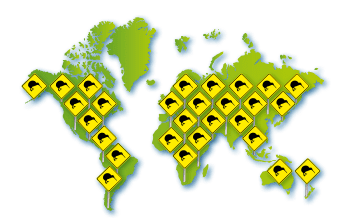Any international relocation is going to offer up a number of logistical issues that will need to be resolved at various stages of your move, and moving to Cape Town is certainly no different. If you want to relocate to Cape Town, it pays to do some research about the visa requirements, the type of weather conditions that prevail, where you might be able to sign up for a Healthcare provider and which suburbs seem to attract the most expats.
We have done a little work here for you today, so you have a jumping-off point towards a trouble-free international relocation, and the first thing you want to do when you are planning a hop across the globe is to ensure you are connecting with a moving company that has extensive experience in moving households – and pets – out of New Zealand.
Shifting overseas is a significant moment, and you want to be certain that your belongings arrive in a timely fashion and in the same condition they were in when you last saw them. So read on as we flag a few points you should consider when moving to Cape Town; you can use our checklist to help you plan a stress-free relocation.
Where Do Most Ex-Pats Live In Cape Town?
Moving to a new city can be daunting if you don’t know anyone there, especially if there is a language barrier. So, when you are planning your move, it pays to look for housing in an area where you might be able to connect with other ex-pats. They are likely to be able to share their experiences with you, help you engage socially, and direct you to the best services and leisure spots.
Cape Town has a diverse range of suburbs, each with its own distinct charm and character. Your lifestyle, interests, and needs will likely determine which suburb will be the best fit for you.
City Bowl and Sea Point offer a bustling urban lifestyle with beautiful views of the Atlantic Ocean for people looking for a cosmopolitan ambience and accessibility to the city centre.
Due to good schools and a calm environment, Constantia and Rondebosch’s green, family-friendly suburbs are ideal for those relocating with school-age children. If you’re looking for a sea change, the settlements of Hout Bay and Fish Hoek provide stunning beaches and a laid-back atmosphere.
Ticking All Your Moving Boxes
Once you have identified which suburb you want to live in and connected with a local estate agent to find your perfect property, you can begin working towards moving day. There are a number of boxes to tick to ensure you arrive in the country with a smooth landing. Let’s go through these now.
- Visa and Legal Matters: Check the South African visa requirements and make sure you have all the appropriate papers. South Africa offers a variety of visa choices for jobs, education, and retirement, so choose the one that best suits your needs.
- Work and Home: Plan ahead if you need to relocate for a job. Aside from looking for a place to reside that is close to work, you should explore your options for transport to and from work. Can you park your car onsite, or is there public transport?
- Be Weather-Wise: Remember to pack according to Cape Town’s seasons. Bring clothing for both the hot summers and the rainy winters. Also, look at shipping options for your purchases, as some may require customs clearance.
- Health and Vaccinations: Schedule a comprehensive health check-up before your international move. Inquire about specific health recommendations and vaccinations for South Africa, and ensure you have all necessary medications and prescriptions.
- Money: Open a local bank account and become acquainted with the South African Rand (ZAR). Because Cape Town has a robust banking infrastructure, setting up your funds should be pretty simple.
- International Shipping: Consider the logistics of moving abroad. Research international shipping options, including air and sea freight. Some items may require customs clearance, so ensure you have the necessary paperwork.
- Set Up Services: Your real estate agent should be able to help you find the best providers available. If possible, make sure you set up services like power, water, gas, and internet before you arrive. Check to see if there are any special restrictions for international residents.
Your First Month After Moving to Cape Town
Once you have arrived in Cape Town, it’s time to find your feet! If you have chosen one of the suburbs where there are lots of ex-pats, like Camps Bay, Zonnebloem and Gardens, or Noordhoek or Kalk Bay, you have likely met some people you can rely on to give you great tips to help you enjoy the local area and move around from place to place.
In your first month, you should sort out:
- Healthcare: Register with a local medical practice and sort out your health insurance; you will likely need to switch to a local provider.
- Transportation: Familiarise yourself with routes and schedules. Explore the city on buses, taxis, and trains. Check-in with other expats in your neighbourhood to ensure you are moving around safely.
- Orientate Yourself Culturally: Enrol in cultural orientation programmes or interact with expatriate groups to become acquainted with local cultures, practices, and social standards.
- Security and safety: Like any major metropolis, Cape Town has safety concerns. Learn about foreign resident safety requirements, areas to avoid, and general precautions.
Relax And Let Us Do The Heavy Lifting
As you can see, deciding to relocate to Cape Town is a fairly significant move and shifting to an area where there is already an established ex-pat community is definitely a good idea. Another good idea is to let The Moving Company take care of safe passage for your belongings and pets.
Our dedicated team has lots of experience with offshore relocations, and we can pack up your house, ship your items, and help you organise a smooth moving to South Africa.
Get in touch today, and let’s get you moving to Cape Town!




